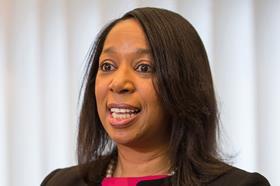As highlighted in the first article of the Gazette’s Black History Month series (5 October), I can attest that networks like the Black Solicitors Network (BSN) are both a precursor to progress and a way of defending it.

An award-winning not-for-profit organisation, the BSN is committed to achieving equality of access, retention and promotion of aspiring and existing black solicitors across England and Wales. An inclusive rather than exclusive organisation, BSN attracts and welcomes members (both individuals and firms/corporates/other organisations) from across the cultural and diversity spectrum. Current membership is around 5,000.
BSN was founded in 1995 by a group of like-minded sole practitioners who shared a vision of a dynamic body that promoted and represented the interests of black solicitors. At that time, black and minority ethnic (BME) solicitors were predominantly concentrated in small or sole practitioner firms and a significant number were legal aid-funded. This remains the case. Over the years, legal aid has been the target of deficit reduction policies, and an early success for BSN (through mobilising like-minded practitioners and lobbying public bodies) was achieving a delay in the introduction of legal aid civil contracting, which allowed firms further time to plan and prepare for legal aid reform. BSN remains supportive of this sector of the profession and continues to provide network support in these challenging times.
On a broader level, BSN’s mission has evolved to encompass medium to large firms. Observing the under-representation of BME lawyers in corporate life, BSN developed and published the first Diversity League Table in 2006. Thereafter, in 2008 the City branch of BSN (BSN City Group) was formed with the aim of focusing on the needs of, and issues affecting, black corporate/commercial lawyers. Both the Diversity League Table and the work of BSN City Group have had a major impact on access to the profession and how lawyers of BME backgrounds are perceived, putting to rest the misconception that there is only a limited pool of talented BME lawyers from which to recruit and promote to senior roles.
BSN comprises three region-specific groups through which we represent the interests of our members:
- BSN City Group (London)
- BSN North (Manchester)
- BSN Midlands (Birmingham).
Our mission, and offering to members and stakeholders are achieved through an extensive programme of initiatives and events:
- BSN student initiatives – careers workshops, internship opportunities and a new national grassroots programme designed to increase equality of access to the legal profession. It will be delivered through a series of careers and skills workshops, networking events and unique opportunities;
- BSN’s Student Guide for undergraduates from black, Asian and minority ethnic backgrounds;
- BSN’s Junior Lawyers Group focuses on connecting junior BME lawyers for relationship building and providing a forum for support, inspiration and guidance.
- BSN City Group’s ‘Creating Pathways’ is an annual mentoring and sponsorship programme for 2-6 PQE BME lawyers.
- Professional/career development and role model seminars, dinner events and high-profile Black History Month events.
- BSN Jobs Board portal for jobs and career opportunities from employers who want to reach a diverse pool of talent (jobs.blacksolicitorsnetwork.org).
- BSN’s Diversity League Table (DLT) – sponsored by the Law Society, the DLT is considered the legal profession’s leading diversity reporting initiative for leading firms and chambers covering gender, ethnicity, sexual orientation and disabilities (blacksolicitorsnetwork.co.uk/the-findings). In 2017, we undertook a review and analysis of the datasets collected from firms over the 10 years of the DLT. An emerging theme from this retrospective was that, despite the development of a wide body of experience, knowledge and initiatives in diversity and inclusion, there has been little discernible change in terms of gender and ethnic diversity at the middle to senior levels of the profession. This prompted us to look beyond annual demographic reporting towards exploring and identifying where change is happening within the profession and what it takes to make progress on diversity and inclusion. This will form the basis for the next DLT publication, which will be published in the coming months.
- BSN’s UK Diversity Legal Awards (diversitylegalawards.org). Now in their 11th year, these are the only UK industry awards to focus solely on recognising and promoting diversity, inclusion and equality across the legal profession.
- Participation in consultations initiated by the Law Society, the Solicitors Regulation Authority and other regulatory, parliamentary and government bodies relating to matters affecting BME lawyers.
Working in partnership with our supporters and members, BSN creates and delivers this comprehensive range of initiatives and events which contribute to ensuring that our members are supported at all stages of their career and professional development. We have been doing this for 25 years and our impact is far-reaching. We are not complacent, however, and continue to strive for an equal profession as there is still more work to be done to achieve this goal.
Recent tumultuous events (in particular the Black Lives Matter movement) have amplified the structural and systemic barriers to equality, equity and fairness within society and our profession. As the primary voice of black solicitors across the country, BSN has challenged firms and organisations to ‘walk the talk’, to turn positive intentions into positive action and create a level playing field. BSN’s September 2020 Open Letter to the profession on racial diversity can be found here.
We hope the legal profession and its leaders will take up the mantle, as the time for action and change is now.
Paulette Mastin is chair of the Black Solicitors Network






























